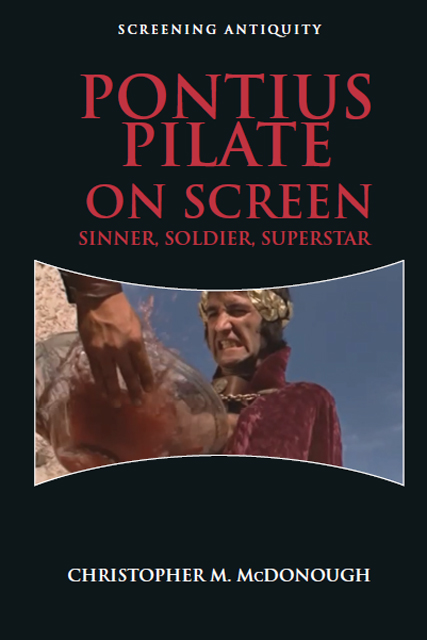Book contents
- Frontmatter
- Contents
- List of Figures
- Acknowledgements
- Series Editors’ Preface
- Frontispiece
- Prologue: ‘Do You Enjoy Being a Symbol, Pontius?’ The Trial of Pontius Pilate and Governor Collins
- 1 Quod Scripsi Scripsi
- 2 The Silent Pilate
- 3 The Roman in the Living Room: Pilate on TV in the Early 1950s
- 4 Mrs Pilate: Claudia Procula and Clare Boothe Luce
- 5 Pilate in CinemaScope, or Notes on Roman Camp
- 6 Finding Meaning in the Middlebrow: Pilate in the 1960s
- 7 What Is Truth? Pilate as 1970s Moral Relativist
- 8 Michael Palin’s Accent in Monty Python’s Life of Brian, and a Few Others
- 9 Grand and Not-So-Grand Inquisitors of the Reagan Age
- 10 ‘We at War’: Pilate for the New Millennium
- Epilogue: A Time of Handwashing
- Works Cited
- Index
7 - What Is Truth? Pilate as 1970s Moral Relativist
Published online by Cambridge University Press: 03 June 2023
- Frontmatter
- Contents
- List of Figures
- Acknowledgements
- Series Editors’ Preface
- Frontispiece
- Prologue: ‘Do You Enjoy Being a Symbol, Pontius?’ The Trial of Pontius Pilate and Governor Collins
- 1 Quod Scripsi Scripsi
- 2 The Silent Pilate
- 3 The Roman in the Living Room: Pilate on TV in the Early 1950s
- 4 Mrs Pilate: Claudia Procula and Clare Boothe Luce
- 5 Pilate in CinemaScope, or Notes on Roman Camp
- 6 Finding Meaning in the Middlebrow: Pilate in the 1960s
- 7 What Is Truth? Pilate as 1970s Moral Relativist
- 8 Michael Palin’s Accent in Monty Python’s Life of Brian, and a Few Others
- 9 Grand and Not-So-Grand Inquisitors of the Reagan Age
- 10 ‘We at War’: Pilate for the New Millennium
- Epilogue: A Time of Handwashing
- Works Cited
- Index
Summary
The view of all three of us [President Nixon, Attorney General John Ehrlichman and Haldeman] through the whole period was that the truth must be told, and quickly, although we did not know what the truth was.
– H. R. Haldeman, White House Chief of Staff, Testimony to the US Senate Select Committee on Presidential Campaign Activities, 30 July 1973If the popular conception of Pontius Pilate in the 1970s has any specific moment of origin, it can probably be pinpointed to the December 1968 release of a song by the Rolling Stones.
The first track of their bestselling album Beggar’s Banquet, ‘Sympathy for the Devil’ was an enormous hit for the Stones, certified gold in Germany and the UK, and its recording in a London studio was the subject of an avant-garde film by the noted auteur, Jean-Luc Godard. Taken together with the title of their previous album, the relatively poorly selling Their Satanic Majesties Request, ‘Sympathy’ planted the idea for many in the period that Mick Jagger and company were practicing occultists. This sinister impression was cemented a year later when, during the playing of ‘Sympathy for the Devil’ at the unruly Altamont Free Concert for which the Hell’s Angels had been hired as security, a fight broke out in the audience, which ultimately led to the stabbing death of a fan, a moment captured in yet another film about the Stones, Gimme Shelter. But, as understandable as the inference may be, the composition of ‘Sympathy for the Devil’ was not in fact based on Satanism at all. As Mick Jagger told an interviewer years later, ‘[t]he “Sympathy” character is much more complicated because my inspiration for that came from Baudelaire and The Master and Margarita, so I had all these things going on. It’s very much of the time. It’s got the violence of the time’. A copy of The Master and Margarita, a novel written by Mikhail Bulgakov in the Stalin-era Soviet Union and newly translated into English in 1967, had been given to Jagger by his then-girlfriend, Marianne Faithful.
The Master and Margarita is discussed more fully in Chapter 9, but it does not require much more than a passing knowledge of the novel or the Stalinist period in which it was written to appreciate the Stones’ ‘Sympathy for the Devil’ for the masterpiece that it is.
- Type
- Chapter
- Information
- Pontius Pilate on ScreenSinner, Soldier, Superstar, pp. 140 - 171Publisher: Edinburgh University PressPrint publication year: 2022



